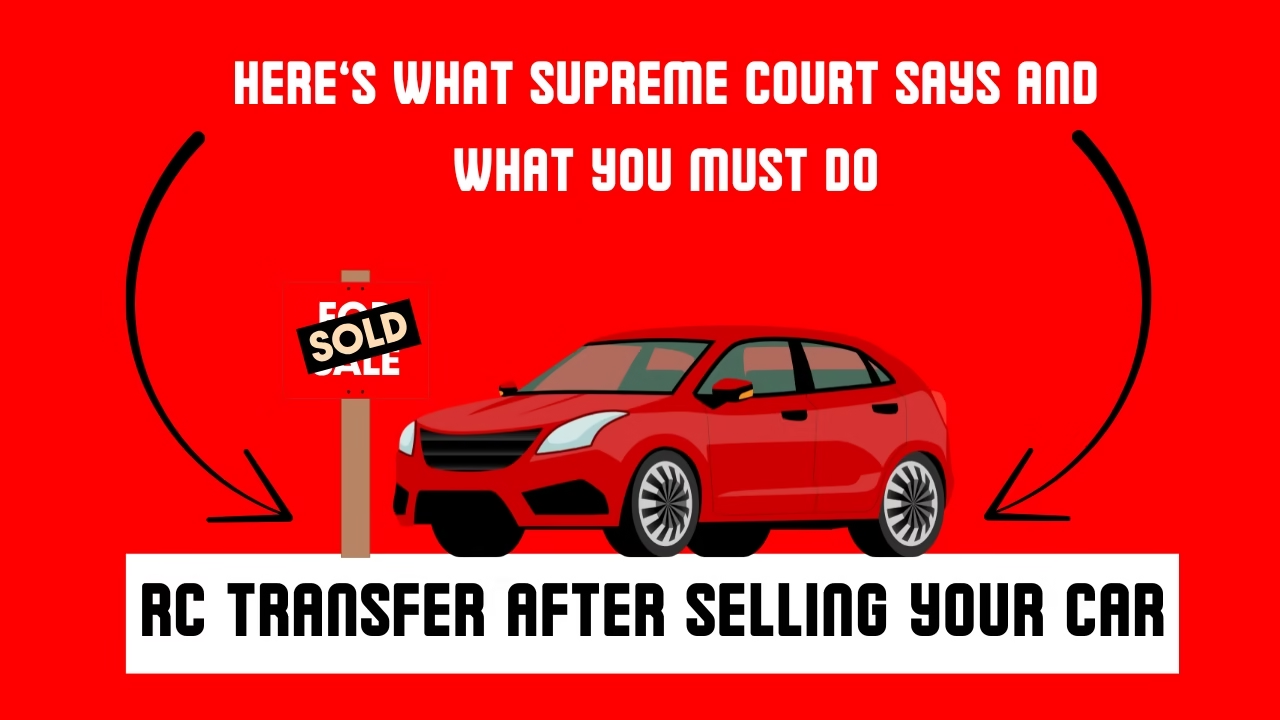RC Transfer Process After Selling Car – sounds like boring paperwork, right? But if you’ve just sold your car or are planning to, don’t scroll past this. The Supreme Court has made it crystal clear – RC transfer after selling your car is not optional. It’s a must to do Legal procedure. If you skip this, you could end up paying for traffic fines, loans, or even court cases filed against the car after you sold it.
Yes, you heard that right. So if you’re wondering how to transfer RC after selling your vehicle or what exactly the Supreme Court RC rule says, this Article breaks it all down into simple steps.
Contents
- Supreme Court Says: RC Must Be Transferred or You’re Still Liable
- Step 1: Inform the RTO Within 14 Days of Selling Your Car
- Step 2: Documents Needed for Car Ownership Transfer
- Step 3: How Much Does RC Transfer Cost?
- Step 4: How Long Does the RC Transfer Take?
- How to Check Car RC Status Online?
- Summary Checklist: RC Transfer Process After Selling Car
Supreme Court Says: RC Must Be Transferred or You’re Still Liable
In a key judgment, the Supreme Court of India ruled that unless the car ownership transfer (through RC) is completed legally, the original owner will remain legally and financially responsible for the vehicle even after it’s sold.
That means:
- If the new owner breaks a traffic rule, you get the challan.
- If the car is used in illegal activity, the police might knock at your door.
- If the buyer fails to pay off a loan on the car, you’re still answerable.
So, the Supreme Court RC rule has made it clear—don’t just hand over the keys and forget about the car. Get the RC transfer after selling your car done. As Soon As Possible.
Step 1: Inform the RTO Within 14 Days of Selling Your Car
The RC transfer process after selling a car starts by informing your local RTO (Regional Transport Office) within 14 days of the sale.
This step is called “intimation of sale,” and it is crucial. If you delay this, you risk facing penalties or even legal issues later.
Step 2: Documents Needed for Car Ownership Transfer
Now comes the paperwork part. Here’s a quick list of documents required for a successful RC transfer process in India:
- Original RC (Registration Certificate) – Must be in the seller’s name.
- Form 29 – Notice of transfer. Signed by both buyer and seller with photos.
- Form 30 – Confirmation of transfer. Again, signed by both parties with photos.
- Form 28 (NOC) – Only needed for inter-state transfer. Some states like Maharashtra may ask for it even for city-to-city transfers.
- Valid Insurance Certificate – Make sure it hasn’t expired.
- PUC Certificate – Pollution check must be up-to-date.
- NCRB Report – Needed only for interstate transfers. It checks if the car is linked to any crime.
💡 Tip: Always keep a scanned copy of every document for future reference.
Step 3: How Much Does RC Transfer Cost?
For cars, the RC transfer fee is usually around ₹300. But remember, this can slightly vary depending on your state’s rules. Some states also charge an additional smart card fee.
Step 4: How Long Does the RC Transfer Take?
If everything is smooth, RC transfer after selling car can be done within 7 working days in some RTOs. But in most cases, expect a timeline of 20 to 30 days.
In case of interstate car ownership transfer, the process may take longer due to coordination between two RTOs.
How to Check Car RC Status Online?
Wondering if your RC transfer is completed or still pending? You can do a Car RC status check online in two easy ways:
- Visit Parivahan Website
- Click on RC Status
- Enter your vehicle number and the captcha code
- Boom! Your current status appears.
- SMS Method:
Send VAHAN<space>VehicleNumber to 7738299899
Example:VAHAN MH01AB1234
Summary Checklist: RC Transfer Process After Selling Car
| Step | What to Do |
|---|---|
| Step 1 | Inform RTO within 14 days of selling the car |
| Step 2 | Collect and submit all required forms (Form 29, 30, etc.) |
| Step 3 | Pay RC transfer fee (~₹300) |
| Step 4 | Track your RC status online or via SMS |
| Optional | Use CarDekho for hassle-free RC transfer |
Selling a car is easy, but skipping the RC transfer process after selling car is risky. You could be unknowingly held responsible for something that happened long after the car left your garage.
Also Read –
Contact Dream11 Customer Care Like This (Working 100%)
